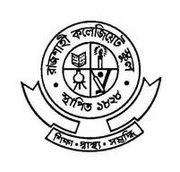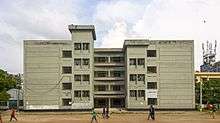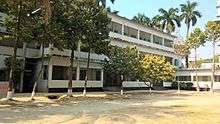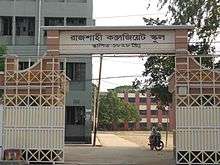Rajshahi Collegiate School
| Rajshahi Collegiate School রাজশাহী কলেজিয়েট স্কুল | |
|---|---|
 | |
| Location | |
|
Sonadighir More, Boalia Rajshahi Bangladesh | |
| Coordinates | 24°21′57″N 88°35′48″E / 24.3657°N 88.5968°ECoordinates: 24°21′57″N 88°35′48″E / 24.3657°N 88.5968°E |
| Information | |
| Type | Public |
| Established | 1828 |
| Number of students | 3,000 |
| Campus | Urban |
| Website |
rcs |
Rajshahi Collegiate School (Bengali: রাজশাহী কলেজিয়েট স্কুল) is a school and college in Boalia Thana in the center of Rajshahi, a city in northern Bangladesh. Established in 1828, it is the first modern school of Bengal and one of the oldest schools of the Indian Subcontinent.[1]
History
During the British Raj, the school was established as the Beauleah School, an English medium institution.
After British colonial rule started in Bengal in 1757, the British started founding educational centers to create a body of officers from the native people. This led to establishment of a number of educational institutions throughout India, and Bengal in particular. A number of institutions were established in Kolkata and the western part of Bengal, but the first school in East Bengal was Rajshahi Collegiate School, followed by Jessore Zilla School, Dhaka Collegiate School, Chittagong Collegiate School and Rangpur Zilla School.[2] Bengali poet and music composer Rajanikanta Sen studied in the school.

Rajshahi Collegiate School is the first and oldest school in the country and has a long tradition and reputation of spreading the light of education. Throughout the country the school has produced thousands of qualified citizens to serve the nation. The school has been fostering its tradition for more than 182 years. Lord William Benting from his personal effort and enthusiasm established this school in 1828 and named it “Bawlia English School” to spread English language all over the country. The activities of the school began on the verenda of a dochala room made of tile near Borokuthi on the bank of the river Padma. At the beginning it was a private and full free school. At that time there was no allocation of government fund for the school. So, the school continued with the assistance and cooperation from the European officers, lawyers, businessmen, men of other professionals, the rajas and zamidars of Puthia, Dubalhati, Dighapatiya, Bolihar and others living in Rajshahi. But the school received William Adam’s recommendation in 1835 after a visit to the school. The school was nationalized on 20 June 1836 after the recommendation had been sent to the government. The government took up the Boalia School as Rajshahi Zilla School and appointed Sharda Parashad Bosu as the Head Master. In that year the total students of the school were 83. Among them 78 were Hindus, 2 Muslims and 3 Christians. In 1836 the student increased to 188. The standard of education was very high.
In its 150th celebration (1986) Sekander Abu Jafore wrote Rajshahi Collegiate School is one of the three government and Higher Secondary Schools in the then undivided Bengal during British reign in 1836. The other two were Hare School of Kolkata and Murshidabad English High School. In 1850 TK 1 was fixed as free for each student of higher classes. As a result, the number of students decreased. In 1844 and 1845, 1 student in both year and in 1847, 3 students got junior scholarship. In 1849 a spacious brick-built building was built in 1857 the total students rose to 146.

At that time there was no education board. Probeshika (now SSS) Examination held under the University of Calcutta in undivided Bengal. The School achieved approval of the University of Calcutta in 1858. Student fees increased TK 2 at this time. The total Number of Students was 215 that year. A time came when the newly built building broke down and fell into the river Padma. As a result, the activities of the school were going on in a rented house. A few rooms were built in 1862 at the present place of the school with financial assistance of the then king of Puthia Jogendrow Narayan Roy.
In 1873 two rooms of College were added to Boalia government English school. Most probably, since then, the school was named Rajshahi Collegiate School. In 1874 two additional buildings of the school were built with the financial assistance of the great queen Shorot Sundory Devi of Puthia. In 1875, 19 students out of 38 passed Entrance Examination. At that time it was a mentionable success. In 1884 two classes of the college were separated and added to present Rajshahi Government College but the school went on under College administration.
In 1907 Fuller Hostel was built with the financial assistance of the then governor of Bengal Mr. Fuller and with the active cooperation of politician Mr. Khan Bahadur Emaduddin. In that very year a separate Hindu Hostel was built for the school. 1912 the then governor the Bengal came to visit the school for the first time. The total students were 500 then. In 1926 then Hindu hostel was placed to raja Promothnath (P.N) hostel. In 1930 the students of the school decreased to 300 for Anti British political movement. In school history the mentionable additions this year were :
1.Formation of Boy Scout 2.Organisation of junior Red cross 3.Publication of Annual School Magazine.

Students of this school showed sign of credit in sports and they won Jackson Shield in 1936 and Brarbon Shield in 1940. A library for the school was established in 1940 A science gallery was also built in the same year (In 1992 it was declared ABANDONED and broken down). From 1954 to 1964 the school was under Rajshahi Teachers Training College and it worked as a laboratory school. In 1969 the school again came under Deputy Director, Secondary and Higher Education. In 1959 the school was promoted to a pilot secondary school under Board Foundation among other schools of the province. In 1962 a two-storied science building and a workshop were built at the cost of 1 lac 10 thousand taka. In 1963 the boundary wall of the school separated both Rajshahi Collegiate School and Rajshahi College.
Morning Shift Started for the first time in 1964. Until 1990 Morning shift was from class three to six and Day shift was from class seven to ten. In May 1991 by a government order “Double Shift” was fully introduced. At present Morning Shift runs from class 3 to 10 and Day shift also runs from 3 to 10 having 2 sections in each class and each shift.
The school encompasses 0.9725 acres of land. Any source or information regarding how the land was obtained is not found out. An unknown amount of land was acquired by the government from the total land for road extension.
For the increasing demand of population several multi-storied buildings have been constructed in the school campus to accommodate more students.
In 1936 the first anniversary of the school was celebrated in a befitting manner at the cost of more than 1 lac taka at that time by the efforts of students, teachers and local people.
In January 1986 (24 to 26 January) the 150th anniversary of the school was celebrated through much encouragement and enthusiasm. An ex-student Abdul Matin (batch-1946) the then chairman of Fedarel Insurance Company, Bangladesh gave away 82 thousand taka (firstly 54 thousand then 28 thousand) to the school to introduce Abdul Matin talency scholarship in this 150th anniversary.
In 2008 Eleven Class was opened in science and commerce group. In 2011 the students first appeared at the HSC examination. Total examinee was 99. Among them from science group the number of appeared students was 74 and 26 students obtained GPA 5.00 including 7 golden A+. Passing rate from science group was 97.3%. From commerce group the number of appeared student was 25 and passing rate 92%.
References
- ↑ "180th founding anniversary of The Rajshahi Collegiate School". The Daily Star. UNB. 18 January 2009.
- ↑ Ratan, Abu Kalam; Kaioum, Mamun Abdul (8 February 2009). "Campus Spotlight: Rajshahi Collegiate School". Star Campus. The Daily Star.